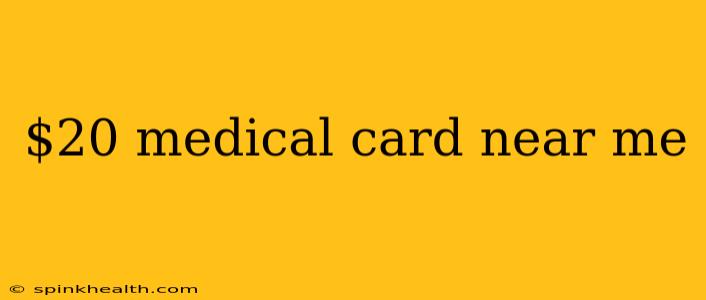Finding Affordable Healthcare: Decoding the "$20 Medical Card Near Me" Search
Let's be honest, the search term "$20 medical card near me" hints at a desperate need for affordable healthcare. It speaks volumes about the anxieties many people face when confronted with unexpected medical costs. While a "$20 medical card" offering comprehensive coverage is highly unlikely, this search reveals a crucial desire: accessible and affordable healthcare options. This article aims to illuminate the realities behind this search and offer pathways to finding genuinely affordable medical care.
Instead of focusing on a mythical "$20 medical card," let's tackle the real issues and potential solutions. We'll explore the landscape of low-cost healthcare options and address common questions people have when searching for affordable medical care.
What does a "$20 medical card" realistically offer?
The term itself is misleading. No legitimate medical insurance plan offers comprehensive coverage for $20. This price point often points towards limited-service cards or heavily restricted plans with significant out-of-pocket expenses. It's crucial to understand that cheap doesn't always mean good value, and the fine print might hold hidden costs and limitations.
Are there any low-cost medical clinics near me?
Absolutely! Many communities offer free or low-cost clinics funded by government programs, charitable organizations, or faith-based initiatives. These clinics often provide basic medical services, such as check-ups, vaccinations, and treatment for minor illnesses. To find one near you, a simple online search for "free clinic near me" or "low-cost healthcare near me" should yield several options. Remember to check the clinic's website or call them directly to confirm their services and eligibility requirements.
What government programs offer affordable healthcare?
In many countries, government-sponsored healthcare programs significantly reduce the financial burden of medical expenses. For example, Medicaid in the United States provides healthcare coverage to low-income individuals and families. Similar programs exist in other nations. Eligibility criteria vary, so researching your local government's healthcare programs is vital. These programs often have income limits and may require documentation to prove eligibility.
What about community health centers?
Community health centers are another excellent resource for affordable healthcare. These centers provide comprehensive primary and preventative care to individuals, regardless of their ability to pay. They are often located in underserved areas and strive to address health disparities within their communities. They offer a wider range of services compared to some free clinics and may have sliding-scale fees based on income.
How can I find affordable prescription medications?
High prescription drug costs contribute significantly to healthcare affordability challenges. Several options can help mitigate these expenses:
- Generic Medications: Opting for generic versions of brand-name drugs can drastically reduce costs while maintaining the same efficacy.
- Prescription Discount Cards: Several companies offer discount cards that can lower prescription costs at participating pharmacies. These cards aren't insurance, but they can offer substantial savings.
- Manufacturer Coupons and Patient Assistance Programs: Pharmaceutical companies often provide coupons or patient assistance programs to help individuals afford their medications.
What if I have an unexpected medical emergency?
Medical emergencies require immediate attention, regardless of cost. Most countries have emergency medical services readily available, typically funded through taxes or government programs. Don't hesitate to seek immediate help if you have a medical emergency. Discuss payment options with the hospital or clinic afterward to explore potential financial assistance programs.
The search for "$20 medical card near me" reflects a pressing need for affordable healthcare. While a single, low-cost card offering comprehensive coverage is unrealistic, numerous resources and programs provide access to affordable or subsidized medical care. By understanding these options and actively seeking them out, individuals can navigate the healthcare system and access the care they need without crippling financial burdens. Remember, proactive research and resourcefulness are key to securing affordable and accessible healthcare.

